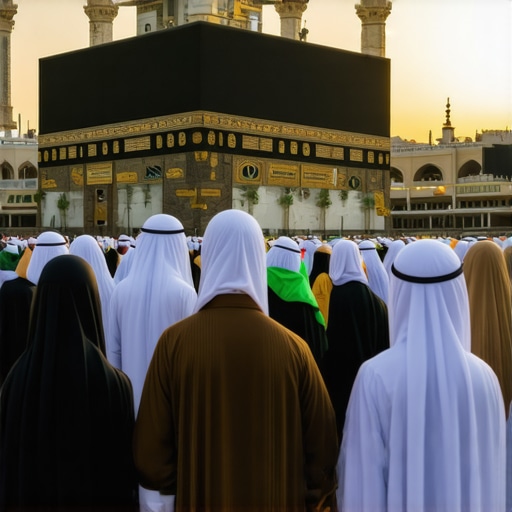My Personal Journey into Dream Interpretation in Islam
Ever since I was young, I found myself captivated by the mysterious realm of dreams. As I grew older and delved deeper into Islamic teachings, I realized that dreams hold sacred messages from Allah, often conveyed through symbols and signs. One particular dream about Prophet Muhammad profoundly changed my perspective, leading me to explore the intricate world of Islamic dream interpretation.
The Sacred Significance of Dreams in Islam
In my experience, dreams are not mere illusions but divine whispers that can guide, warn, or inspire us. Prophet Muhammad himself emphasized the importance of true dreams, considering them part of prophecy (see Prophet Muhammad Dream Interpretation). Recognizing this, I started studying how to interpret dreams accurately, especially those involving sacred symbols or divine messages.
Decoding Symbols: What Did My Dream About Prophet Muhammad Mean?
One night, I dreamt of Prophet Muhammad, peace be upon him, which felt immensely spiritual. I wondered if this dream was a divine message or a reflection of my inner faith. According to Islamic scholars, such dreams often symbolize divine guidance or an encouragement to follow the Sunnah more diligently. I turned to trusted sources like the Islamic Dream Dictionary to understand the symbols better.
How Can I Recognize a True Divine Dream?
In my reflection, distinguishing a true divine dream from ordinary or subconscious visions requires sincerity and prayer. I learned that true dreams often come with a sense of tranquility, clarity, and a message aligned with Islamic morals. As Ibn al-Qayyim explains in his works, dreams can reflect your faith and spiritual state, serving as a mirror to your heart (Ibn al-Qayyim on Dreams).
What Are the Common Symbols in Prophet Muhammad Dreams?
Dreams involving Prophet Muhammad often feature symbols like the Kaaba, water, or light, each carrying profound meanings. For example, seeing the Kaaba can symbolize divine guidance and spiritual closeness. Recognizing these symbols helps me understand the divine messages better. If you’re curious about dream symbols, I recommend exploring Islamic Dream Dictionary for Animals and other trusted resources.
Interpreting dreams is a sacred art that requires both knowledge and sincerity. I encourage you to keep a dream journal, pray for guidance, and seek knowledge from authentic Islamic sources. Feel free to share your experiences or ask questions in the comments below—dreams are a powerful connection to the divine, and understanding them can profoundly enrich our faith journey.
The Hidden Language of Dreams: How Islam Guides Us to Divine Wisdom
Dreams in Islam are considered sacred messages that can reveal divine guidance, warnings, or blessings. As an expert in Islamic dream interpretation, I often emphasize the importance of understanding the symbolism behind these visions. Recognizing authentic signs requires a combination of knowledge, sincerity, and prayer. For instance, dreams involving symbols like the Kaaba or Prophet Muhammad are often laden with profound spiritual significance, pointing towards divine guidance or urging us to strengthen our faith. To deepen your understanding, explore interpretations of dreams about losing teeth in Islam and discover how such symbols relate to your spiritual journey.
Deciphering Sacred Symbols: What Do Dreams of Water or Light Truly Mean?
Dreams featuring water or light are among the most common in Islamic visions, often symbolizing purity, divine mercy, or spiritual awakening. As an expert, I advise paying close attention to the context and feelings within the dream. For example, water can represent divine blessings or purification, especially if it is clear and flowing. Light, on the other hand, symbolizes divine guidance, enlightenment, or the presence of angels. To better interpret these symbols, I recommend consulting trusted resources like Islamic Dream Dictionary. Understanding these symbols can help you navigate your spiritual path with clarity and confidence.
How Can We Differentiate Between Ordinary Dreams and Divine Messages?
Distinguishing between mundane dreams and authentic divine messages is a nuanced process. It requires sincerity, regular prayer, and reflection. True dreams tend to come with a sense of tranquility, clarity, and alignment with Islamic morals. As I often advise, keeping a dream journal can help track recurring themes or symbols that may have divine significance. According to scholars like Ibn al-Qayyim, dreams that carry divine messages often resonate deeply within the heart and may prompt actionable insights aligned with faith and morality. For further guidance, explore true dreams in Islam to learn how to recognize authentic divine visions.
What Practical Steps Can I Take to Enhance My Dream Interpretation Skills?
Improving your ability to interpret dreams requires a combination of study, prayer, and patience. Start by seeking knowledge from authentic Islamic sources, such as the works of Al-Nabulsi or Ibn Sirin, who have documented extensive dream symbols and their meanings. Regularly supplicate for divine guidance before sleeping, asking Allah to grant you clarity and insight. Additionally, engage with community discussions or consult trusted scholars when in doubt. Remember, dreams are a sacred connection to Allah, and sincere effort in understanding them can significantly enrich your spiritual life. For a comprehensive guide, visit authentic Islamic dream interpretation resources and deepen your journey.
If you have experienced meaningful dreams or wish to explore specific symbols further, I encourage you to share your insights or questions. Engaging with others can open new perspectives and reinforce your understanding of the divine messages conveyed through dreams.
Unveiling the Layers of Sacred Dreams: A Personal Reflection on Islamic Dream Wisdom
As I continue to explore the profound world of Islamic dreaming, I realize that each dream carries layers of meaning that often require a nuanced understanding beyond the surface. Dreams involving sacred symbols like the crescent moon or the Prophet Muhammad’s name can serve as gateways to deeper spiritual insights, but interpreting them accurately demands a heart that is sincere and a mind that is attentive to the subtleties.
What Makes a Dream Truly Divine? Personal Insights and Advanced Discernment
In my journey, I’ve observed that a truly divine dream often manifests with a sense of inner tranquility and a clarity that resonates deeply within the soul. Unlike ordinary visions, these dreams tend to leave an indelible impression that prompts reflection and action aligned with Islamic morals. According to scholars like Ibn al-Qayyim, the heart’s receptivity plays a crucial role in discerning divine messages, as the soul must be prepared through prayer and righteousness to receive authentic visions (Ibn al-Qayyim on Dreams).
How Can We Cultivate the Sincerity Needed to Recognize Authentic Dreams?
Building sincerity involves consistent supplication, sincere worship, and heartfelt supplication before sleep. I’ve found that maintaining a dream journal, where I record not only the symbols but also my emotional responses, helps in identifying patterns that might indicate divine origin. Additionally, engaging in dhikr and prayer, especially Salat al-Istikhara, can open the heart to divine guidance and enhance one’s ability to differentiate between mundane and sacred dreams.
How Do Advanced Dream Symbols Reflect Our Spiritual State?
Dream symbols like a radiant light or a flowing river often mirror our inner spiritual condition. For instance, a clear river may symbolize spiritual purification, while a dark, turbulent water could indicate inner struggles. Recognizing these symbols in an advanced context requires understanding their layered meanings; for example, a river might also represent divine mercy or ongoing spiritual nourishment, depending on the dream’s context and the dreamer’s state. Consulting detailed resources like the Islamic Dream Dictionary can deepen this understanding.

Exploring intricate dream symbols in Islamic visions can unlock profound spiritual lessons and divine guidance, enriching our faith journey.
Connecting Personal Experience with Sacred Knowledge
From my personal reflections, I see dreams as a sacred language that Allah uses to communicate with us on levels beyond words. The task lies in cultivating a receptive heart and acquiring the knowledge to interpret these divine messages accurately. I encourage everyone to approach their dreams with humility and sincerity, seeking knowledge from authentic sources and praying for divine guidance. Your experiences, insights, or questions can deepen this collective understanding, so I invite you to share your journey or ask for guidance in the comments below.
Unraveling the Mysteries of Divine Dream Symbols in Islam
In my ongoing journey through the sacred landscape of Islamic dreams, I’ve come to realize that each vision is layered with profound meanings that often transcend superficial understanding. Dreams involving symbols such as the crescent moon or prophetic figures serve as gateways to higher spiritual knowledge. To interpret these accurately, one must develop a refined sensitivity cultivated through sincere prayer, study, and spiritual discipline. As I have explored, understanding the deeper symbolism behind dreams requires a heart open to divine wisdom and an intellect trained in the nuances of Islamic esoteric knowledge (see also: interpretations of dreams about losing teeth in Islam).”}
What Are the Signs of Authentic Divine Revelation in Dreams?
Distinguishing true divine messages from ordinary visions demands a high level of spiritual discernment. Authentic dreams often come with a sense of inner tranquility, clarity, and alignment with Islamic morals. I have learned that such dreams tend to resonate deeply within the heart, prompting genuine reflection and action. Ibn al-Qayyim emphasizes that the purity of the heart and sincerity in worship are essential for receiving authentic divine guidance (see also: Ibn al-Qayyim on Dreams). Recognizing these signs involves cultivating humility, patience, and constant supplication, especially before sleep, to open oneself to divine communication.
Things I Wish I Knew Earlier (or You Might Find Surprising)
The Heart’s Receptivity Matters
One thing I wish I had understood sooner is how crucial sincerity and purity of heart are in truly interpreting dreams in Islam. Sometimes, I dismissed dreams as mere subconscious images, but I’ve learned that sincere prayer and spiritual cleanliness open the doors to authentic divine messages.
The Symbols Are More Than Just Pictures
At first, I thought dream symbols like water or light were just metaphors, but I now realize they carry layered meanings that reflect my spiritual state. For example, a flowing river can symbolize divine mercy but also ongoing spiritual nourishment depending on the context.
Dreams Can Be a Divine Gift or a Test
Not every dream is a message from Allah. Some are tests or reflections of our daily worries. Learning to differentiate between these has been a journey of humility and prayer for me, and I believe it’s vital for anyone seeking divine guidance through dreams.
Keeping a Dream Journal Is a Game-Changer
Recording dreams, feelings, and thoughts upon waking has helped me recognize recurring themes and symbols. This practice, combined with seeking Allah’s guidance, enhances the ability to understand what dreams truly mean.
Authentic Dreams Often Come with Inner Peace
When I experience a dream that feels truly divine, it’s accompanied by a deep sense of tranquility and clarity. Recognizing this peace has helped me trust in the authenticity of certain visions.
Resources I’ve Come to Trust Over Time
- Al-Nabulsi’s Dream Interpretation: His detailed explanations and authentic approach have deepened my understanding of dream symbolism. I highly recommend exploring his works for anyone serious about Islamic dream interpretation.
- Ibn Sirin’s Dictionary of Dreams: A classic resource that provides comprehensive insights into common symbols. It’s a must-have for anyone looking to decode dreams accurately.
- Islamic Dream Interpretation Guides: Many trusted online platforms, like this one, offer well-researched interpretations aligned with Islamic teachings.
- Scholarly Articles and Books: Reading works by scholars like Ibn al-Qayyim has expanded my perspective on dreams as spiritual reflections and divine messages.
Parting Thoughts from My Perspective
Reflecting on my journey with dream interpretation in Islam, I realize that dreams are a sacred language from Allah that requires sincerity, knowledge, and patience to understand. The symbols, feelings, and contexts all point towards divine guidance or warnings that can significantly shape our spiritual path. I encourage everyone to keep an open heart, seek knowledge from authentic sources, and pray for clarity. If this resonates with you, I’d love to hear your own experiences or thoughts—sharing our insights can deepen our collective understanding of this divine gift. Feel free to share your journey in the comments or reach out for guidance. Remember, dreams are a bridge to divine wisdom, and exploring them can truly enrich your faith and life.”,




Reading this post truly resonated with my personal understanding of dreams in Islam. I’ve also found that dreams involving Prophet Muhammad, peace be upon him, often leave a deep impression on the heart, compelling us to reflect on our faith and actions. I remember a dream where I saw the Prophet in a luminous light, and it prompted me to renew my commitment to following his teachings more diligently. The symbolism of water and light, as the post highlights, can be powerful indicators of divine mercy and guidance. I agree that sincerity and prayer are essential in deciphering these visions—without them, it’s easy to misinterpret. In my experience, maintaining a consistent zikr and asking Allah for clarity before sleep has helped me better recognize authentic divine messages. How do others cultivate sincerity and patience in their dream interpretation journey? I’d love to hear different methods that have worked for others on this sacred path.
This post resonated deeply with my own experiences in Islamic dream interpretation. I recall a vivid dream where I saw myself walking towards the Kaaba in a peaceful state, which felt like a direct message of spiritual closeness and guidance. Over time, I’ve learned that consistent prayer, especially Salat al-Istikhara, and maintaining a sincere heart are crucial for understanding whether a dream is a divine message. Sincerity truly acts as a filter, allowing us to discern the authentic guidance from everyday subconscious images. I’ve also found that keeping a detailed dream journal helps in recognizing recurring symbols and themes, which can reveal a lot about one’s spiritual journey. For many, developing patience while waiting for clarity is challenging, but I believe that regular supplication and humility can nurture the sincerity needed to receive divine messages. How do others manage their inner distractions and stay focused on cultivating sincerity during their spiritual practices? Would love to hear your insights on strengthening this essential aspect of dream interpretation.
This post resonated with me deeply, especially the importance of sincerity and prayer in interpreting dreams, which I have found to be crucial in my own spiritual journey. I recall a dream where I saw Prophet Muhammad, peace be upon him, and it felt like a direct message of reassurance and divine guidance. Cultivating patience and consistency in prayer has helped me recognize these divine signals more clearly. I agree that maintaining a dream journal is a game-changer; it allows us to notice recurring themes and symbols over time, deepening our understanding. I am curious about others’ experiences—how do you balance daily distractions with your efforts in dream interpretation? Are there specific practices that have helped you strengthen sincerity and maintain a receptive heart? I believe that sincere supplication and humility are key, but I’d love to hear more about practical methods others use to nurture these qualities.
Reading this post truly deepened my appreciation for the significance of dreams in Islam. I’ve personally experienced moments where a dream left me with a sense of peace and clarity, prompting me to take specific actions in my faith and daily life. What stood out to me is the importance of sincerity and prayer in distinguishing divine messages from subconscious thoughts. I wonder, how do others here strengthen their hearts and minds to remain receptive, especially amidst the distractions of daily life? I’ve found that consistent dhikr and asking Allah for guidance before sleep greatly enhance the likelihood of perceiving authentic dreams. Moreover, maintaining a humble attitude and keeping a dream journal have been invaluable in my journey. It’s fascinating how symbols like light and water can hold such profound meanings depending on our spiritual state. I’d love to hear your personal strategies for cultivating sincerity and patience in this sacred process—your insights could truly help others along this spiritual path.